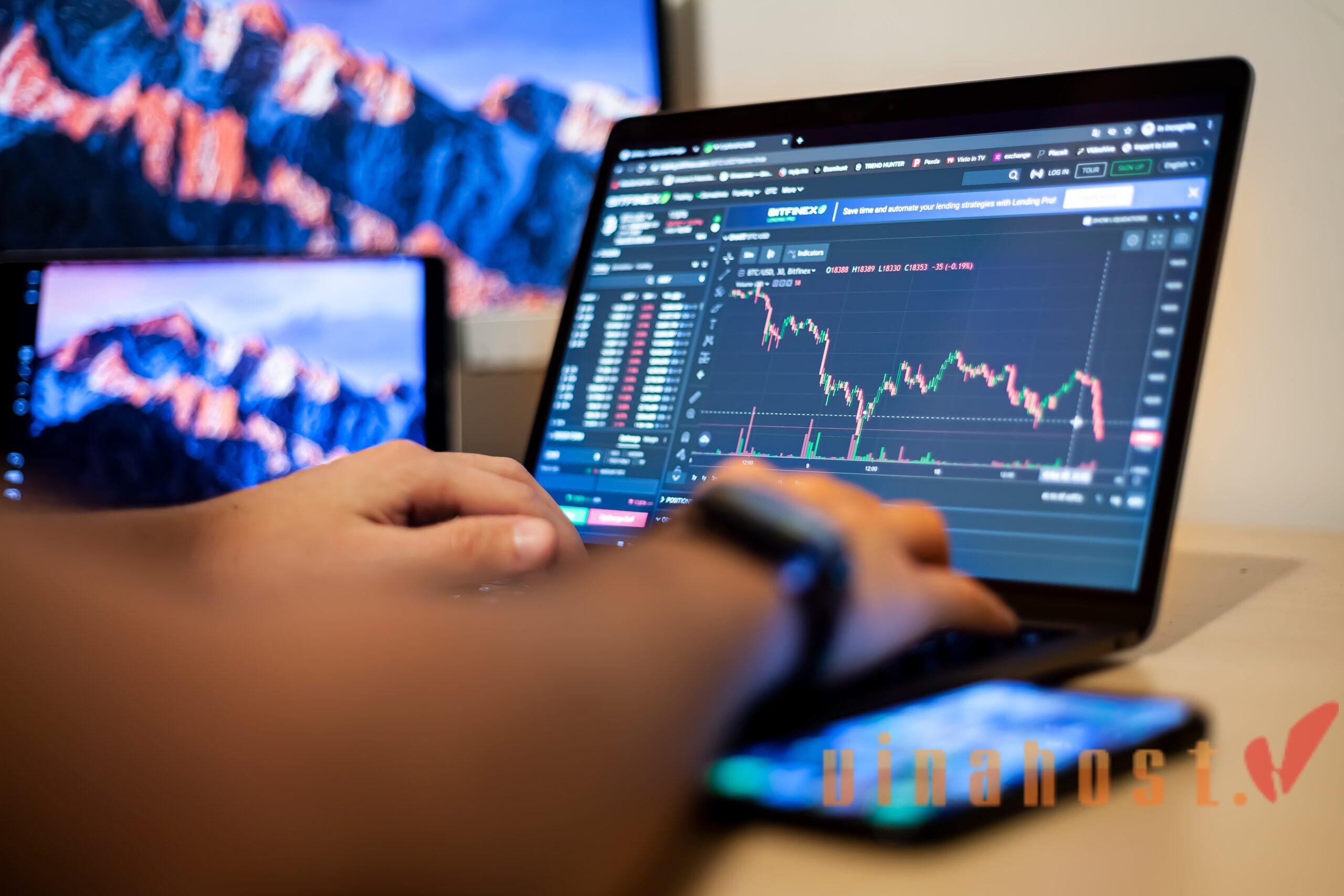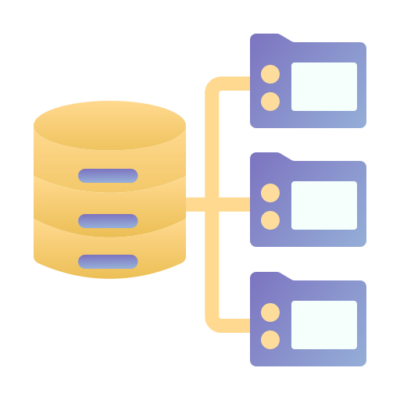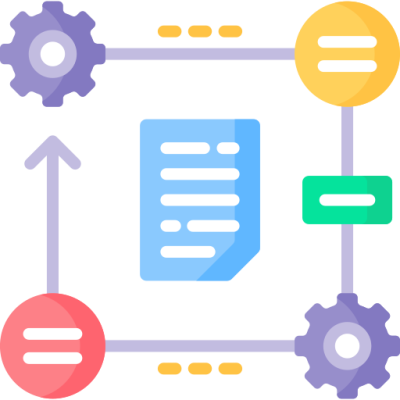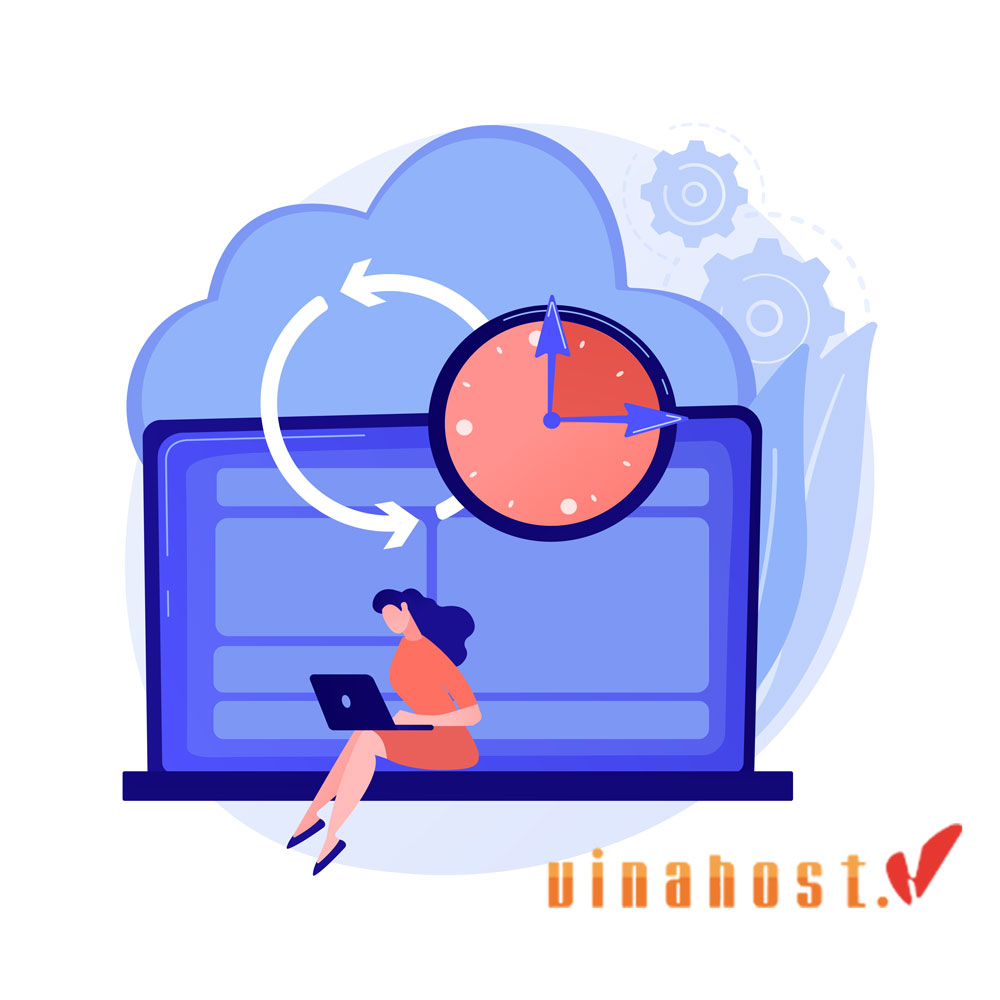In the fast-paced world of Forex trading, speed, reliability, and uninterrupted connectivity can make all the difference between a successful trade and a missed opportunity. Traders have utilized Forex VPS (a specialized hosting service tailored for traders seeking optimal trading conditions) to run their trading software, such as MetaTrader (MT4/MT5) or cTrader, ensuring round-the-clock access to trading platforms and the ability to execute trades swiftly, even during volatile market conditions. But exactly what is Forex VPS? Find out more with VinaHost!
1. What is Forex VPS?
Forex, short for Foreign Exchange, refers to the global marketplace where currencies are traded against each other. It is the largest and most liquid financial market in the world, with daily trading volumes exceeding trillions of dollars. Forex trading involves buying one currency while simultaneously selling another, with the aim of profiting from fluctuations in exchange rates between currency pairs.
Many people opt to trade using their personal PC, which seems like the obvious choice. However, some traders prefer utilizing a Forex VPS.

What is Forex VPS hosting? Forex VPS is essentially a virtual private server equipped with its own operating system, dedicated hardware resources, and a unique IP address. The distinction lies in how Forex traders utilize this virtual server to execute orders in the currency market.
Traders install their preferred electronic trading platform on the VPS, allowing them to manually manage their portfolios or employ robots/EAs to execute automated trading strategies.
Latency in Forex trading can lead to execution delays, slippage, missed opportunities, and increased trading costs. Therefore, traders aiming for precision and efficiency in their trading strategies must consider and manage latency effectively. And they have used Forex VPS to reduce the latency in forex trading to enhance their overall trading performance.
Also read: What is NVMe VPS? | The Difference between NVMe VPS vs SSD VPS
2. How Does a Forex VPS Work?
Now that you understand what is a Forex VPS, let’s delve into an important aspect: how does it work?
A Forex VPS (Virtual Private Server) acts like a dedicated computer specifically designed for your Forex trading needs. It resides within a data center, constantly connected to the internet with high-bandwidth lines.
A Forex VPS offers a reliable and high-performance computing environment specifically tailored for the demands of Forex trading. It helps minimize downtime, reduces latency, and provides a secure platform to execute your trades effectively.
Firstly, you sign up with a Forex VPS provider and choose a plan that offers the resources (CPU, RAM) you need for your trading platform and any automated tools (Expert Advisors). The provider grants you access to your virtual machine through a remote desktop application. This allows you to install your preferred Forex trading platform (like MetaTrader 4 or 5) and configure your trading strategies.
Many Forex VPS providers have data centers situated near major financial hubs like London, New York, and Tokyo. This geographical proximity translates to faster transmission of data between your VPS and your broker’s servers, reducing latency (delays) in your trades.
Unlike your personal computer, a Forex VPS is designed to run continuously. The data center ensures a stable power supply and redundant systems to minimize downtime. This is crucial for Forex trading, as the market operates 24/5.
And unlike shared hosting, a Forex VPS allocates dedicated resources solely for your trading activities. This ensures your platform has the processing power and memory it needs to run smoothly, especially when handling complex trading algorithms or during periods of high market volatility.
Reputable Forex VPS providers also offer robust security measures to protect your trading platform and data from cyber threats. Additionally, they typically provide backups of your VPS data to ensure minimal disruption in case of unforeseen issues.
3. Why Use a Forex VPS?

3.1. Uninterrupted Uptime
- Continuous operation: Forex VPS ensures that trading platforms and automated systems (EAs) remain operational 24/7. This is crucial because the Forex market operates across different time zones and trading sessions, including weekends.
- No-downtime: Unlike personal computers that may need maintenance, updates, or can experience power outages, a Forex VPS runs continuously without interruption, ensuring you never miss trading opportunities.
3.2. Speed Matters
- Low latency connectivity: Forex VPS is strategically located near some major financial centers and trading servers. This proximity reduces latency (the delay between sending an order and its execution), ensuring trades are executed at optimal prices.
- Minimized slippage: Fast execution speed helps minimize slippage, where the actual trade execution price differs from the expected price due to market volatility. This is particularly important for scalpers and traders who execute high-frequency trades.
3.3. Automation on Autopilot
- Deploying automated strategies: Traders can install and run Expert Advisors (EAs) or automated trading algorithms on a Forex VPS. These EAs can execute trades automatically based on predefined criteria, such as technical indicators, without manual intervention.
- Round-the-clock trading: Automation allows traders to take advantage of trading opportunities in global markets at any time, even when they are not actively monitoring the markets themselves.
3.4. Enhanced Security
- Secure environment: Forex VPS providers implement robust security measures, including firewalls, encryption, and intrusion detection systems, to protect trading activities and personal data.
- Data protection: Traders’ sensitive information, such as login credentials and transaction details, are safeguarded from unauthorized access and cyber threats, ensuring peace of mind.
3.5. Peace of Mind
- Stability and reliability: Using a Forex VPS provides a stable and reliable trading environment. Traders do not need to worry about internet connectivity issues, power outages, or hardware failures that could disrupt trading activities.
- Focus on strategy: By offloading trading activities to a Forex VPS, traders can focus more on developing and refining their trading strategies, analyzing market trends, and making informed decisions rather than managing technical infrastructure.
4. The Advantages and Disadvantages of Using a Forex VPS

4.1. The Advantages of a Forex VPS
- High reliability and uptime: Forex VPS ensures uninterrupted operation of trading platforms and Expert Advisors (EAs), even during power outages or internet disruptions, providing continuous uptime crucial for trading in global markets.
- Speed matters: Latency (delay) in trade execution can be costly in the fast-paced world of Forex trading. Forex VPS providers strategically locate their data centers close to major financial hubs. This geographical proximity reduces the distance data needs to travel significantly, minimizes latency and ensures faster trade execution speeds.
- Enhanced security: VPS providers implement robust security measures, safeguarding trading activities and personal data from cyber threats. This includes encryption, firewalls, and intrusion detection systems, ensuring a secure trading environment.
- Automation on autopilot: Many Forex traders rely on automated trading strategies using Expert Advisors (EAs). A Forex VPS ensures your EAs can run continuously without interruption, even if you turn off your personal device. This allows you to take advantage of around-the-clock trading opportunities.
- Flexibility and accessibility: Traders can access their Forex VPS from anywhere via internet connection, using various devices. This flexibility allows for monitoring trades and adjusting strategies remotely, enhancing convenience and efficiency.
- Scalability and resource allocation: Forex VPS offers scalable resources (CPU, RAM, storage) based on trader needs, ensuring optimal performance during peak trading periods. This scalability accommodates growing trading volumes without compromising speed or reliability.
See more VPS services from VinaHost:
4.2. The Disadvantages of a Forex VPS
- Cost considerations: Forex VPS services incur monthly fees, which can vary depending on the provider and package. This ongoing cost may be a consideration for traders, especially those with smaller trading capital or minimal trading activity.
- Technical expertise required: Setting up and managing a Forex VPS requires basic technical knowledge, such as installing trading platforms, configuring EAs, and maintaining server settings. Traders without technical expertise may face challenges or require external support.
- Dependence on Internet connectivity: While a Forex VPS ensures server uptime, traders remain dependent on stable internet connectivity for accessing and managing their VPS. Internet disruptions can temporarily limit access to trading platforms and affect trade execution.
- Potential security risks: Despite robust security measures, Forex VPS users must remain vigilant against potential security risks, such as phishing attacks or malware targeting trading platforms. Regular updates and security protocols are necessary to mitigate these risks.
- Overreliance on automation: While automated trading can enhance efficiency, overreliance on EAs or trading algorithms may lead to unintended consequences, such as executing trades based on outdated market conditions or technical glitches.
- Broker and platform compatibility: Traders must ensure their chosen broker and trading platform are compatible with the Forex VPS environment. Incompatibility issues could affect data synchronization, order execution, and overall trading performance.
5. Choosing the Right Forex VPS Provider

5.1. Essential Factors to Consider
When choosing the right Forex VPS provider, there are several essential factors to consider to ensure it aligns with your trading needs and budget:
- Uptime guarantees: Look for providers offering at least 99.5% uptime. This minimizes downtime that could disrupt your trades.
- Server quality: Reliable hardware with redundant systems ensures smooth operation.
- Infrastructure: A robust infrastructure with high-bandwidth connections is crucial for fast data transmission.
- Server location: Choose a provider with servers located near your broker’s servers or major financial hubs (London, New York, Tokyo) to reduce latency (delays) in trade execution.
- Security measures: Reputable providers offer features like firewalls, DDoS protection, and regular backups to safeguard your trading platform and data from cyber threats.
- Cost: Forex VPS pricing varies based on resources (CPU, RAM). Compare plans to find a balance between cost and your needs. Look for transparent pricing and no hidden fees.
- Scalability: As your trading needs evolve, you may need more resources. Choose a provider that allows for easy upgrades to your VPS plan.
- Reliable and responsive support: Having access to helpful customer service is essential for resolving any technical issues that might arise.
5.2. Popular Forex VPS Providers
Here are some popular Forex VPS providers that are well-regarded in the trading community. These providers are known for their reliability, low latency connections, security features, and support for popular trading platforms and automated trading strategies.
- Vultr: Known for its global presence and high-performance virtual private servers, Vultr offers flexible plans with multiple data center locations worldwide. Traders appreciate Vultr for its reliability and low latency connections.
- AccuWeb Hosting: AccuWeb Hosting provides VPS hosting optimized for Forex trading, offering robust security features, high uptime guarantees, and 24/7 technical support. They cater specifically to traders needing reliable and scalable hosting solutions.
- ForexVPS.net: Specializing in Forex VPS hosting, ForexVPS.net offers low latency solutions with data centers strategically located near major financial hubs. They provide support for popular trading platforms like MetaTrader and cTrader, ensuring fast execution speeds.
- Beeks Financial Cloud: Beeks Financial Cloud focuses on ultra-low latency connectivity tailored for financial markets. They have data centers in key global locations, including London, New York, and Tokyo, to ensure minimal latency for traders executing high-frequency trading strategies.
- Amazon Web Services (AWS): AWS provides cloud-based VPS solutions with extensive scalability and global availability. Traders can benefit from AWS’s robust infrastructure, which includes secure data centers and reliable connectivity options suitable for advanced trading needs.
Also read: [HOT] Top 15 Best VPS Hosting Providers [Updated]
6. What is the difference between Forex VPS vs Other Server Solutions
6.1. Forex VPS vs Dedicated Server
We can see that Forex VPS server offers affordability, scalability, and low latency, making it suitable for Forex traders requiring reliable performance and automation capabilities; while dedicated Servers provide exclusive use of resources, enhanced security, and consistent performance, making them ideal for applications needing high performance and customization.
| Feature | Forex VPS | Dedicated Server |
| Definition | Virtual private server optimized for Forex trading. | Physical server exclusively dedicated to one user. |
| Hardware Resources | Shared CPU, RAM, and storage with other VPS users. | Dedicated CPU, RAM, and storage resources. |
| Performance | Performance can vary based on server load. | Consistently high performance for single user. |
| Scalability | Scalable resources based on VPS plan. | Limited scalability without hardware upgrades. |
| Latency | Low latency with data centers near financial hubs. | Low latency, but can vary based on location. |
| Security | Robust security measures, but shared environment. | Enhanced security with physical isolation. |
| Cost | Lower cost compared to dedicated servers. | Higher cost due to exclusive use of resources. |
| Management | Managed by VPS provider; minimal user maintenance. | Requires user management and IT expertise. |
| Flexibility | Flexible in terms of resource allocation and plans. | Limited flexibility without hardware changes. |
| Suitability | Ideal for traders needing fast execution and uptime. | Suitable for high-demand applications and intensive tasks. |
Also Read: What is the difference between VPS and Dedicated Server?
6.2. Forex VPS vs Cloud Hosting
- Forex VPS offers dedicated resources optimized for Forex trading, ensuring low latency and reliable performance ideal for automated trading strategies.
- Cloud Hosting provides scalability, flexibility, and enhanced security suitable for a wide range of applications and services beyond trading.
| Feature | Forex VPS | Cloud Hosting |
| Definition | Virtual private server optimized for Forex trading. | Scalable virtual infrastructure hosted in the cloud. |
| Hardware Resources | Dedicated resources within a virtual environment. | Shared resources across multiple virtual servers. |
| Performance | Consistent performance based on VPS plan. | Scalable performance based on cloud service tier. |
| Scalability | Limited scalability based on VPS provider plans. | Highly scalable, resources can be adjusted on demand. |
| Latency | Low latency with data centers near financial hubs. | Latency can vary based on cloud provider and location. |
| Security | Robust security measures, but shared environment. | Enhanced security protocols, data encryption. |
| Cost | Generally lower cost compared to cloud hosting. | Costs can vary, typically pay-as-you-go model. |
| Management | Managed by VPS provider; minimal user maintenance. | User manages applications, scalability, and resources. |
| Flexibility | Flexible in terms of resource allocation and plans. | Highly flexible with scalability and service options. |
| Suitability | Ideal for Forex traders needing low latency and uptime. | Suitable for scalable applications, websites, and services. |
Also read: What is the difference between Cloud Server and VPS
7. Is a Forex VPS Right for You?
Determining whether a Forex VPS is right for you involves considering several factors related to your trading habits, technical requirements, and overall objectives.
Forex VPS can benefit you if:
- You rely on automated trading strategies (Expert Advisors): A Forex VPS ensures your EAs can run 24/7 without interruption, even if your personal computer is off. Even for manual traders, a VPS can provide uninterrupted access to trading platforms and data, especially if you trade frequently or during non-standard hours.
- You prioritize minimal downtime: Assess your tolerance for downtime. If you cannot afford interruptions to your trading activities due to internet outages, power failures, or hardware issues, a Forex VPS’s guaranteed uptime and stability can provide peace of mind.
- Low latency is crucial for your trading strategy: Determine the importance of low latency for your trading. If executing trades quickly and at optimal prices is critical (especially for scalping or high-frequency trading), a Forex VPS’s proximity to trading servers can offer significant advantages over traditional setups.
- You value security for your trading platform and data: Reputable Forex VPS providers offer robust security measures to protect your financial information and trading strategies.
- You experience frequent power outages or internet connectivity issues: A Forex VPS located in a data center with reliable power and internet infrastructure can help mitigate these disruptions.
- You have technical expertise: Evaluate your technical skills and comfort level with managing IT infrastructure. A Forex VPS typically requires basic knowledge to set up trading platforms, install EAs, and manage server configurations. If you prefer minimal hands-on management, choose a provider with robust support options.
- Let’s think about Cost vs. benefits: Consider the cost-effectiveness of a Forex VPS relative to potential benefits. Compare monthly fees with potential gains from improved trade execution, reduced slippage, and enhanced security. If these benefits outweigh the costs, a VPS may be justified.
Forex VPS might not be necessary if:
- You are a casual trader who doesn’t use automated strategies: If you only trade occasionally and manually, a Forex VPS might be an unnecessary expense.
- You have a reliable internet connection and a powerful computer: If your current setup experiences minimal downtime and latency issues, a Forex VPS might not offer significant advantages.
- You are just starting your Forex trading journey: As a beginner, it might be wiser to gain experience with a standard trading platform before investing in a Forex VPS.
It’s important for you to take advantage of trial periods or money-back guarantees offered by VPS providers to test their services. Additionally, read reviews and seek feedback from other traders to gauge the reliability, support quality, and overall satisfaction with different providers.
Also read: What is gaming VPS? | Choosing the Right gaming VPS Provider
8. The Future of Forex VPS

We think that the future of Forex VPS looks promising as technology continues to advance and trading becomes increasingly automated and globalized. With demands for faster execution speeds and reliable connectivity growing, Forex VPS services are likely to evolve with enhanced features such as improved latency, scalability, and security measures.
As more traders adopt algorithmic trading strategies and require uninterrupted access to markets, VPS providers may expand their offerings to cater to specific trading needs, including AI-driven analytics and predictive modeling.
Moreover, advancements in cloud computing and edge computing technologies could further revolutionize Forex VPS capabilities, making them more accessible and efficient for traders worldwide.
Overall, the future of Forex VPS appears poised to support a more efficient and competitive trading environment in the years to come.
Also read: What is SSD VPS Hosting? | Everything You Need to Know
9. FAQs
9.1. What software can I run on a Forex VPS?
In essence, any software that supports your Forex trading activities can potentially be run on a Forex VPS, as long as it’s compatible with the operating system your provider offers (usually Windows or Linux).
Here are some of the common types of software that traders often run on Forex VPS:
- Forex trading platforms: The primary purpose of a Forex VPS is to host your Forex trading platform. Popular options include MetaTrader 4, MetaTrader 5, cTrader, NinjaTrader, and others. These platforms allow you to place trades, monitor markets, and conduct technical analysis.
- Automated trading software (Expert advisors): Many Forex traders utilize automated trading strategies implemented through Expert Advisors (EAs). A Forex VPS ensures these EAs can run continuously without interruption, even if your personal computer is turned off.
- Trading bots: Similar to EAs, trading bots can be used for automated trading based on pre-defined parameters. Forex VPS provides a reliable environment for running these bots 24/7.
- Market data feeds: Real-time market data feeds are essential for informed trading decisions. Some Forex VPS providers might offer integrated data feeds or allow you to install third-party data feed software on your VPS.
- Technical analysis tools: Various technical analysis software programs can be used to analyze market trends and identify trading opportunities. These programs can be installed and run on your Forex VPS alongside your trading platform.
- Remote desktop software: You’ll use remote desktop software to access and manage your Forex VPS from any device with an internet connection. This software provides a graphical interface to interact with the VPS as if you were using a local computer.
9.2. How much bandwidth do I need?
Forex trades involve relatively small data packets containing order information (currency pair, volume, price). These data packets require minimal bandwidth for transmission. The bandwidth requirements for your Forex VPS depend on several factors below, but generally, Forex trading itself doesn’t consume a significant amount of bandwidth:
- Number of charts: The number of charts you have open simultaneously on your trading platform can influence bandwidth usage. Each additional chart requires updating data feeds, which translates to slightly more bandwidth consumption.
- Data size: The size of data packets transmitted during trading, such as market data feeds, order requests, and trade confirmations, impacts bandwidth requirements. This includes both incoming (data feeds) and outgoing (orders execution) traffic.
- News and updates: Following live market news or economic data releases might increase bandwidth usage if you’re constantly streaming these updates on your VPS.
- Automated trading activity: While Forex trades themselves use minimal bandwidth, complex automated trading strategies with frequent trade executions might require slightly more bandwidth.
- Number of trading terminals: If you run multiple trading terminals or platforms simultaneously on your VPS, each terminal will contribute to the overall bandwidth consumption.
- Additional services: Consider any additional services or applications running on the VPS that may contribute to bandwidth usage, such as remote desktop access, data backups, or synchronization services.
To help you answer the question “How much bandwidth do I need?”, you can refer to our typical bandwidth requirements below:
- Starting point: For basic Forex trading with a few charts and limited news updates, a bandwidth of 1 Mbps (Megabit per second) might be sufficient.
- Room for growth: As your trading activity increases, consider plans offering 2 Mbps to 5 Mbps to accommodate more charts, data feeds, and potential future needs.
- High-frequency trading: If you engage in high-frequency trading with complex strategies and frequent executions, you might need plans with 10 Mbps or higher bandwidth.
In general, Forex VPS providers typically offer plans with sufficient bandwidth allocations suitable for most traders’ needs. It’s advisable for you to check the specifics of each VPS plan to ensure it meets your expected bandwidth requirements.
Also Read: What is Windows VPS? | Who Should Use a Windows VPS?
9.3. Is a Forex VPS secure?
Yes, a Forex VPS can be secure when proper security measures are in place. Reputable VPS providers employ robust security protocols such as firewalls, encryption, intrusion detection systems, and DDoS protection to safeguard their servers and client data from cyber threats.
While a Forex VPS from a reputable provider can offer a secure environment, it’s important to remember that security is an ongoing process.
It’s essential for traders to also contribute to security by using strong passwords, enabling multi-factor authentication, and keeping their trading platforms and applications updated with the latest security patches.
Additionally, encrypting data transmissions and implementing secure remote access practices further enhance the security of Forex VPS environments. By combining these measures, traders can mitigate risks and ensure a secure environment for conducting their Forex trading activities.
9.4. Is Forex VPS necessary for all Forex traders?
Forex VPS is not necessary for all Forex traders, as its usefulness depends on individual trading needs and preferences. Traders who engage in manual trading, have minimal need for continuous uptime, or operate on low-frequency strategies may find that a standard home or office setup meets their requirements adequately.
However, Forex VPS becomes beneficial for traders who rely on automated trading strategies (EAs or robots) requiring 24/7 operation, need low latency for rapid trade execution, or seek enhanced security and reliability. It also benefits traders who prefer to offload the technical aspects of server management to focus more on trading itself.
Ultimately, the decision to use a Forex VPS should be based on factors such as trading style, frequency, latency sensitivity, and the need for uninterrupted access to trading platforms.
9.5. How much does a Forex VPS cost?
The primary factor influencing cost is the resources your VPS plan offers. This includes CPU processing power, RAM (memory), and storage space. Naturally, packages with higher resource allocation will cost more.
Here are some general cost ranges based on typical offerings:
Basic Plans: Basic VPS Forex plans can start from around $10 to $30 per month. These plans usually include essential resources such as a dedicated amount of CPU, RAM, and storage, suitable for moderate trading volumes and basic automation needs.
Mid-range Plans: Plans with higher specifications and better performance can range from $30 to $100 per month. These plans may offer increased CPU cores, more RAM, faster SSD storage, and possibly better data center locations for lower latency.
High-end Plans: For traders with intensive trading needs or specific requirements like ultra-low latency, high-frequency trading (HFT), or large-scale automation, high-end Forex VPS plans can cost $100 or more per month. These plans often provide the highest performance, robust security features, and premium support services.
Also read: What is GPU VPS? | Choosing the Right GPU VPS Provider
10. Conclusion
In conclusion, understanding “what is Forex VPS” is crucial for traders looking to optimize their Forex trading experience. As discussed, a Forex VPS offers significant advantages, including enhanced speed, reliability, and security tailored specifically for trading operations. By leveraging a Forex VPS, traders can ensure minimal latency in executing trades, which is vital for strategies reliant on split-second decisions and automated trading systems like Expert Advisors (EAs).
We hope this article makes Forex VPS crystal clear for you. If you need help or rent a VPS Cambodia don’t hesitate to contact us:
- Email: support@vinahost.vn
- Hotline: 1900 6046
- Livechat: https://livechat.vinahost.vn/chat.php
Find out more articles at our Blog or read more:
What is Linux VPS? | Choosing the Right Linux VPS Provider
What is VPS Security? | 13 Best Practices for VPS Security
What is Cambodia VPS Hosting? | Everything you need to know
What is Thailand VPS Hosting? Top 8 benefits of Thailand VPS Hosting


















